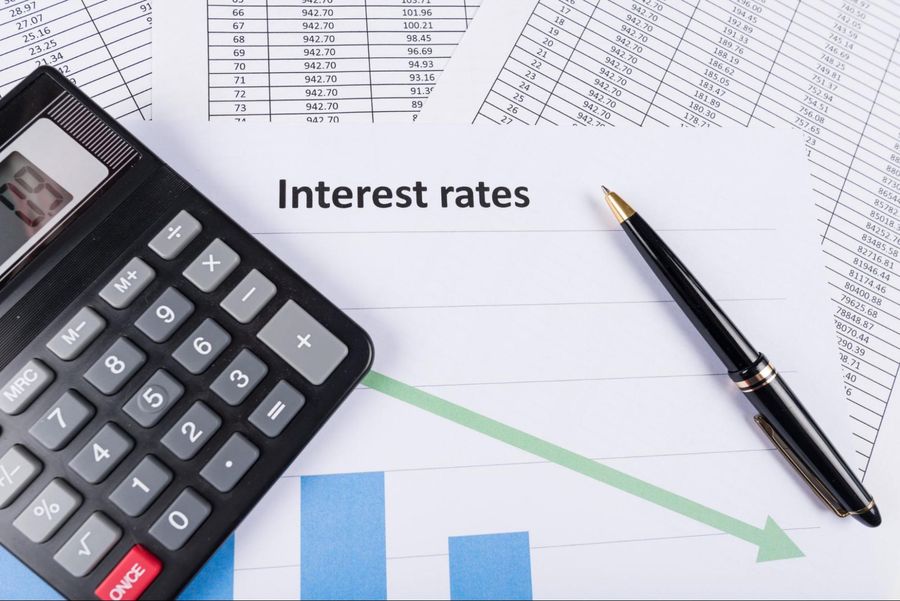Anyone who has bought a house at some point can tell you: mortgages are complicated. Simply looking at the list price of the home tells you very little about how much money you will actually need to close a sale. Additional fees like closing costs, as well as the many different mortgage options like amortization period, or a down payment amount, can significantly change the way that your mortgage works.
One of the biggest factors in your mortgage is your mortgage rate. This rate represents the amount of interest you pay on your mortgage loan and can make a difference of thousands of dollars. Ideally, you want to get the lowest rate possible, but most of the time your options are limited to the rates offered to you.
In this guide, we will explain everything you need to know about mortgage rates such as:
- How are mortgage rates determined?
- What sort of rates are available?
- How can I get the best rate?
- What happens when mortgage rates change?
Why do mortgage rates exist?
Mortgages are essentially a way for banks to help people buy homes that otherwise do not have the full amount to put down. However, you must remember that banks are businesses and they need to make money like any other. Therefore, your bank will not simply give you a loan for free.
Though homes increase in value, your lender does not usually benefit from this equity, instead, they make money from mortgages by charging interest on your payments. The amount at which you pay interest is your mortgage interest rate and this is usually expressed as a percentage.
What mortgage interest rates mean for your monthly mortgage payment
Mortgage interest is paid simultaneously along with your mortgage principal. With each monthly mortgage payment, the amount of interest you owe will be calculated based on the current loan balance remaining.
The actual calculation can get a bit complicated due to compounding. Though you may have a loan interest rate of say 3%, if this is compounded semi-annually, you are more accurately paying 1.5% twice a year, with an effective mortgage rate that is slightly higher than 3% due to compounding. Therefore, the total amount you pay yearly to maintain a loan, including any additional fees, called your mortgage Annual Percentage Rate (APR), is usually higher than your actual stated rate.

This amount is then divided between each month of your payment, so your actual interest percentage per month may be much smaller. At the same time, you are gradually paying down your loan balance, which means the value used for your interest calculation is changing all the time.
Fortunately, since most mortgages use fixed monthly mortgage payment amounts, with the ratio between interest and principal paid to change with each monthly payment, it’s possible to determine your total amount of interest paid over the course of your loan. If you want to know more, an online mortgage calculator can offer you a full breakdown of your mortgage.
An example
So for example, with $600,000 in principal at 3% interest and monthly mortgage payments over 25 years, you would end up paying over $250,000 in interest alone, with a final paid amount of around $850,000.
The same calculation, with a 2.5% interest rate would save you almost $45,000, which shows how much even a half percentage can affect how much you pay.
Your mortgage rate also determines your loan serviceability. So while homes were cheaper in the past, mortgage rates were historically much higher, therefore, the actual costs of monthly payments have not grown at the same pace as home prices.
How mortgage rates are determined
There are a few things that go into determining what interest rate you are actually offered by your lender.
Fixed vs. variable interest rates
For one, the type of mortgage you take will affect your rates. Fixed mortgages are the most popular type and they hold the same fixed interest rate for the course of their loan term which is usually anywhere from 1-10 years. Since the cost of lending can change all the time, banks take on more risk by locking in a fixed interest rate for a longer period or locking it in at all. Therefore, fixed interest rates tend to be higher, with the highest rates being given to longer terms.
Variable-rate mortgages tend to have lower rates since they can change all the time, but this will not always be the case. However, since your bank is able to regularly change your rate to reflect the cost of lending, they can offer rates that more reflect the current market and do not need to account for as much for future changes.
It’s worth noting, however, that variable rates don’t always compound semi-annually like fixed-rate mortgages, so the rates aren’t as directly comparable. It also means that you can not truly calculate the total interest paid on a variable mortgage from the start as you do not know how rates will change over time.
Credit score and more
can also affect your mortgage rate, as mortgage lenders are less likely to give you the best rate if you are a riskier lender based on your credit history. Generally, borrowers with a credit score above 680 will get the best rates while a borrower with a low credit score will receive a higher mortgage interest rate.
Other things that can affect your rate are your down payment amount, the property type being purchased, and your amortization period.
Why do mortgage rates change?
What you may not know about banks is that they do not simply hold all their money in a big vault and often have a lot of their money in circulation. Your bank may, at times, even be required to borrow money, either from the Central Bank of Canada or from other banks. In the course of these transactions, they also pay interest like you do. Therefore, just as it costs you money to borrow from a bank, it costs the banks to lend to you. In order for them to make any money, they have to charge you a rate at least somewhat higher than their lending price. The price of lending can be affected by different factors.
The variable-rate mortgage is affected primarily by the Bank of Canada’s overnight rate, also known as the prime interest rate. This is a rate determined by the Bank of Canada to determine how much lending should cost, and in doing so, have some impact on the economy. This essentially works by positioning themselves as the most expensive to borrow from or lend to, encouraging banks to lend to one another at a target rate.

In the recent recession caused by the COVID pandemic, for example, the Bank of Canada has dropped their overnight rate to record lows in order to encourage the economy to keep working through hard times by reducing the cost of spending and borrowing money.
Fixed-rate mortgages are more closely tied to government bond yields. These bonds represent a very secure place for banks to hold money long-term as they are guaranteed to repay at least the principal amount upon maturity. Though higher bond yields mean higher returns, it also means they cost more to acquire, leading to an increase in mortgage rates.
What is a good mortgage rate?
The question of a good mortgage rate will depend on your particular circumstance. Ultimately, the best rate you can get will be the one that pays the least interest over time. A bad rate would be one that makes you pay a lot more in interest. There is not really a rate that is strictly unaffordable as mortgage lenders require home buyers to remain .
The most popular lenders in the country are the big six banks, and they tend to have pretty competitive rates with one another. Currently, 5-year fixed mortgage rates (the most popular mortgage product) are at around 2.7 – 3%. Rates for are currently around 1.4 – 1.75%. Interest rates are currently at very low levels and are forecasted to increase in the coming years.
Alternative mortgage lenders
Beyond the major banks, there are alternative lenders who may offer very different rates. Often, these lenders cater to buyers who could not get loans from the big banks and their rates can vary greatly between them. While some may offer lower rates than the banks, they may also have additional fees or differences in compounding that can cost you a lot more.
Corben joined CREW as a relative newcomer to the field of real estate and has since immersed himself and learned from the experts about everything there is to know on the topic. As a writer with CREW, Corben produces informative guides that answer the questions you need to know and reports on real estate and investment news developments across Canada. Corben lives in Guelph, Ontario with his partner and their two cats. Outside of work, he loves to cook, play music, and work on all kinds of creative projects. You can contact Corben at corben@crewmedia.ca or find him on Linkedin at https://www.linkedin.com/in/corbengrant/.









